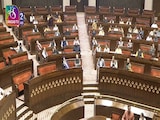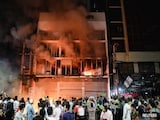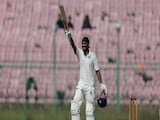The nearly three-week-long stand-off between a government college in Karnataka's Udupi district and a handful of Muslim students who want to wear a hijab during classes escalated Thursday morning after they protested at the college gates with placards.
The students said stopping them from wearing a hijab - their seniors were allowed - violates their fundamental right, and that they feel uncomfortable without one when sitting before male lecturers.
"We came to the college wearing a hijab. However, we have been barred once again from attending the classes," Aliya, one of the students, told NDTV.
"We've been barred for 20 days for wearing hijab. We want justice," Resham said, as another student, Muskan Zainab, asked, "The Constitution gives us the right to wear a hijab, why is the college stopping that?"
The fresh protests come a day after college authorities and district officials gave the students an ultimatum - fall in line with the dress code and receive an education, or wear one and go home.
The protests also come after the state's Education Minister BC Nagesh told NDTV the practice amounted to "indiscipline" and that schools and colleges were "not a place to practice dharma".
Mr Nagesh also accused "a few people" - a reference to the PFI-associated Campus Front of India backing the students - of politicising the issue ahead of the 2023 Assembly election, and demanded to know why the students "want to practice constitutional rights now".
On that charge the students today denied any connection to the CFI.
"We are not influenced by Campus Front of India. We are not a part of them. Since we did not get a positive response (or) any support, we approached CFI," Aliya told NDTV.
Earlier Mr Nagesh told NDTV rules regarding the dress code had been in place since 1985 and that these protests only erupted 15-20 days ago.
He claimed over 100 Muslim students enrolled at that particular college had no issue and "only these students don't want to follow (the dress code)... School is not a place to practice dharma".
Asked if the Education Department should infringe on the girls' right to practice their religion, and if wearing of a hijab, or headscarf, violated any guidelines, Mr Nagesh pointed to the Congress.
"When Congress government was there... they followed the rule. But now they have a problem? They want to practice constitutional rights now? Indiscipline cannot be a right," he said.
The protesting students told NDTV that their parents had repeatedly requested college authorities to allow them to wear the hijab, but to no avail.
"We can't sit comfortably... That is why we are wearing a hijab. This is a government college... a girl's college (but) we have male lecturers. If there are women lecturers, we don't mind sitting without a hijab but we have male lecturers. We are not comfortable," Safa, a second-year student, said.
Aliya, told NDTV her seniors had been allowed to wear the hijab during classes, but that they had been "mentally tortured" for doing so.
"There is religious discrimination in the college. We can't say 'salaam'... can't talk in Urdu even though it is a government college. Other students are allowed to speak in Tulu (a local language)... lecturers speak to us in Tulu. But we are not allowed to speak in Urdu," she said.
She also insisted the college's terms and conditions make no reference to the wearing of a hijab; "Why are they acting like we are committing a crime? We are only asking for a headscarf," she said.
Yesterday Mr Nagesh acknowledged the state government "has not fixed a uniform (dress) code" but urged the protesting students to nonetheless follow the rule.















